Alcohol and Mental Health | Essay
VerifiedAdded on 2022/08/29
|11
|3144
|30
AI Summary
Contribute Materials
Your contribution can guide someone’s learning journey. Share your
documents today.
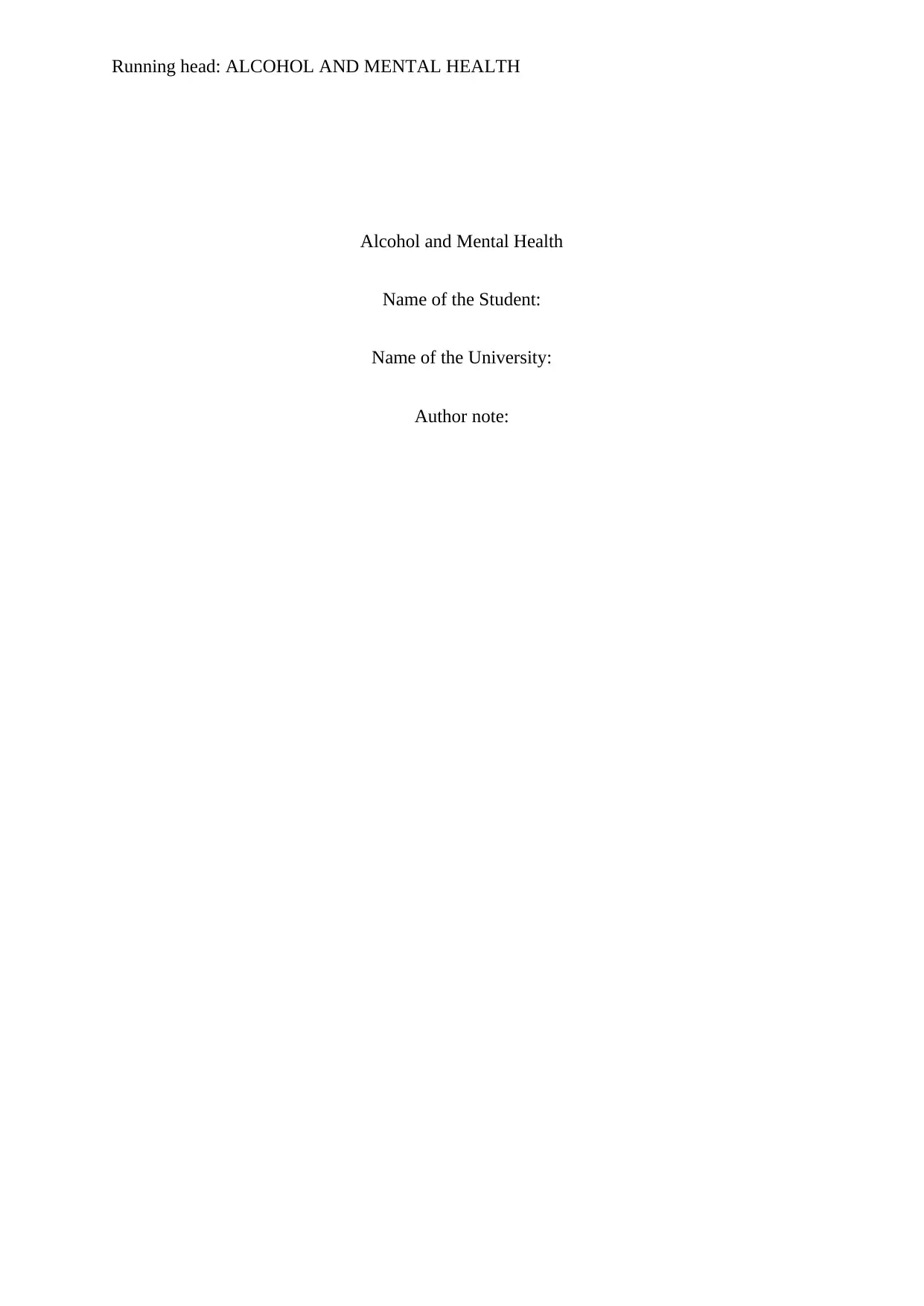
Running head: ALCOHOL AND MENTAL HEALTH
Alcohol and Mental Health
Name of the Student:
Name of the University:
Author note:
Alcohol and Mental Health
Name of the Student:
Name of the University:
Author note:
Secure Best Marks with AI Grader
Need help grading? Try our AI Grader for instant feedback on your assignments.
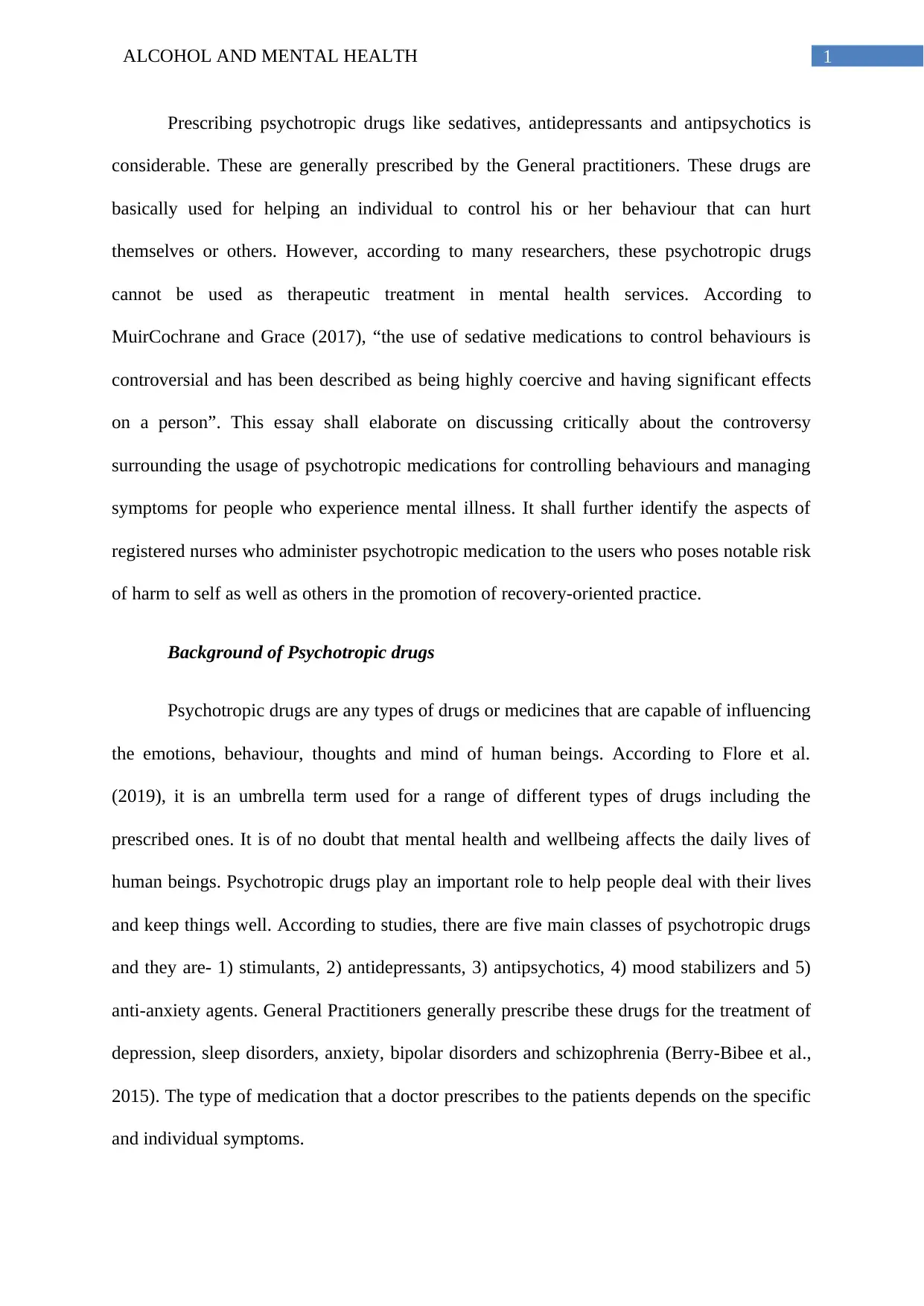
1ALCOHOL AND MENTAL HEALTH
Prescribing psychotropic drugs like sedatives, antidepressants and antipsychotics is
considerable. These are generally prescribed by the General practitioners. These drugs are
basically used for helping an individual to control his or her behaviour that can hurt
themselves or others. However, according to many researchers, these psychotropic drugs
cannot be used as therapeutic treatment in mental health services. According to
MuirCochrane and Grace (2017), “the use of sedative medications to control behaviours is
controversial and has been described as being highly coercive and having significant effects
on a person”. This essay shall elaborate on discussing critically about the controversy
surrounding the usage of psychotropic medications for controlling behaviours and managing
symptoms for people who experience mental illness. It shall further identify the aspects of
registered nurses who administer psychotropic medication to the users who poses notable risk
of harm to self as well as others in the promotion of recovery-oriented practice.
Background of Psychotropic drugs
Psychotropic drugs are any types of drugs or medicines that are capable of influencing
the emotions, behaviour, thoughts and mind of human beings. According to Flore et al.
(2019), it is an umbrella term used for a range of different types of drugs including the
prescribed ones. It is of no doubt that mental health and wellbeing affects the daily lives of
human beings. Psychotropic drugs play an important role to help people deal with their lives
and keep things well. According to studies, there are five main classes of psychotropic drugs
and they are- 1) stimulants, 2) antidepressants, 3) antipsychotics, 4) mood stabilizers and 5)
anti-anxiety agents. General Practitioners generally prescribe these drugs for the treatment of
depression, sleep disorders, anxiety, bipolar disorders and schizophrenia (Berry-Bibee et al.,
2015). The type of medication that a doctor prescribes to the patients depends on the specific
and individual symptoms.
Prescribing psychotropic drugs like sedatives, antidepressants and antipsychotics is
considerable. These are generally prescribed by the General practitioners. These drugs are
basically used for helping an individual to control his or her behaviour that can hurt
themselves or others. However, according to many researchers, these psychotropic drugs
cannot be used as therapeutic treatment in mental health services. According to
MuirCochrane and Grace (2017), “the use of sedative medications to control behaviours is
controversial and has been described as being highly coercive and having significant effects
on a person”. This essay shall elaborate on discussing critically about the controversy
surrounding the usage of psychotropic medications for controlling behaviours and managing
symptoms for people who experience mental illness. It shall further identify the aspects of
registered nurses who administer psychotropic medication to the users who poses notable risk
of harm to self as well as others in the promotion of recovery-oriented practice.
Background of Psychotropic drugs
Psychotropic drugs are any types of drugs or medicines that are capable of influencing
the emotions, behaviour, thoughts and mind of human beings. According to Flore et al.
(2019), it is an umbrella term used for a range of different types of drugs including the
prescribed ones. It is of no doubt that mental health and wellbeing affects the daily lives of
human beings. Psychotropic drugs play an important role to help people deal with their lives
and keep things well. According to studies, there are five main classes of psychotropic drugs
and they are- 1) stimulants, 2) antidepressants, 3) antipsychotics, 4) mood stabilizers and 5)
anti-anxiety agents. General Practitioners generally prescribe these drugs for the treatment of
depression, sleep disorders, anxiety, bipolar disorders and schizophrenia (Berry-Bibee et al.,
2015). The type of medication that a doctor prescribes to the patients depends on the specific
and individual symptoms.
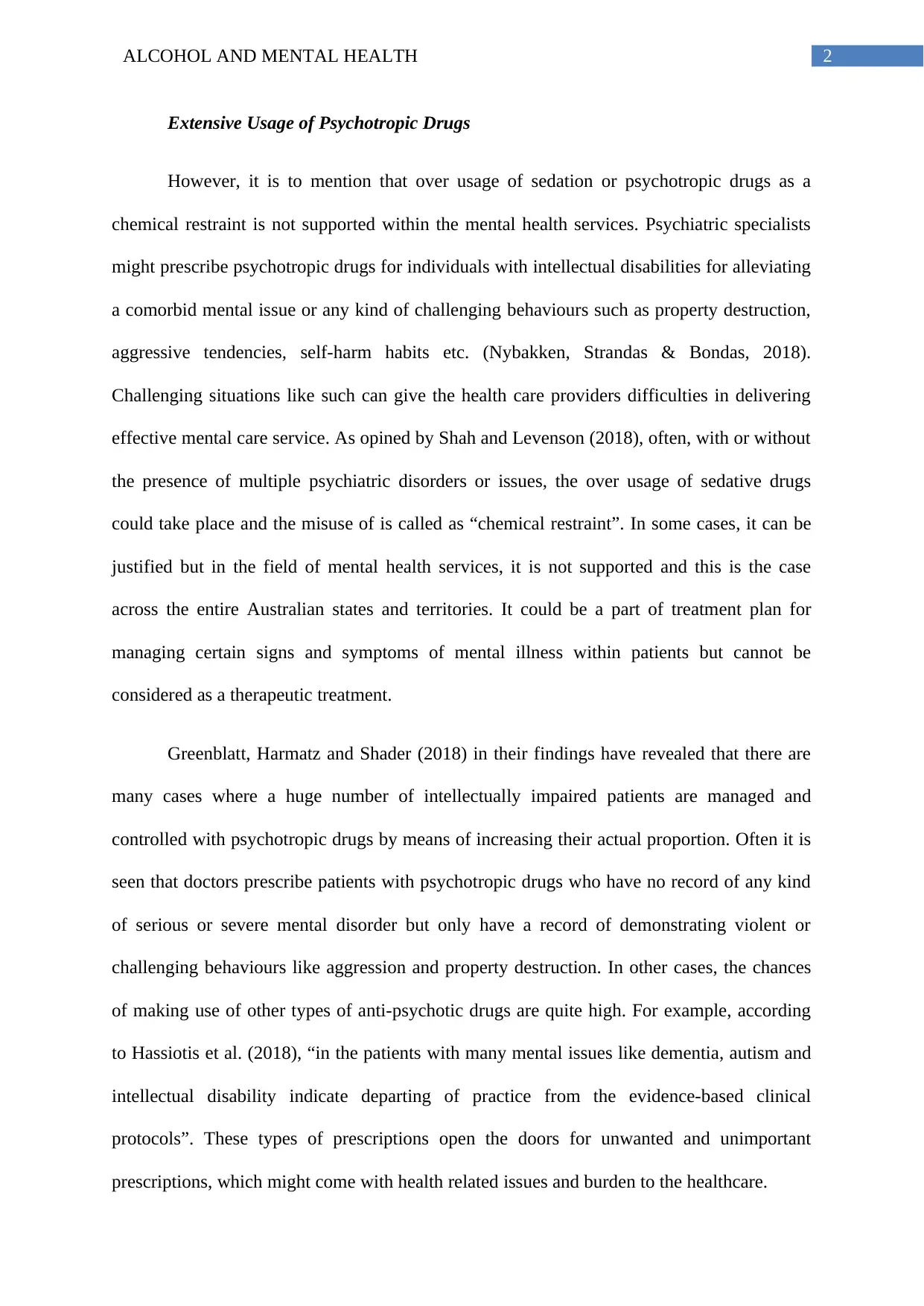
2ALCOHOL AND MENTAL HEALTH
Extensive Usage of Psychotropic Drugs
However, it is to mention that over usage of sedation or psychotropic drugs as a
chemical restraint is not supported within the mental health services. Psychiatric specialists
might prescribe psychotropic drugs for individuals with intellectual disabilities for alleviating
a comorbid mental issue or any kind of challenging behaviours such as property destruction,
aggressive tendencies, self-harm habits etc. (Nybakken, Strandas & Bondas, 2018).
Challenging situations like such can give the health care providers difficulties in delivering
effective mental care service. As opined by Shah and Levenson (2018), often, with or without
the presence of multiple psychiatric disorders or issues, the over usage of sedative drugs
could take place and the misuse of is called as “chemical restraint”. In some cases, it can be
justified but in the field of mental health services, it is not supported and this is the case
across the entire Australian states and territories. It could be a part of treatment plan for
managing certain signs and symptoms of mental illness within patients but cannot be
considered as a therapeutic treatment.
Greenblatt, Harmatz and Shader (2018) in their findings have revealed that there are
many cases where a huge number of intellectually impaired patients are managed and
controlled with psychotropic drugs by means of increasing their actual proportion. Often it is
seen that doctors prescribe patients with psychotropic drugs who have no record of any kind
of serious or severe mental disorder but only have a record of demonstrating violent or
challenging behaviours like aggression and property destruction. In other cases, the chances
of making use of other types of anti-psychotic drugs are quite high. For example, according
to Hassiotis et al. (2018), “in the patients with many mental issues like dementia, autism and
intellectual disability indicate departing of practice from the evidence-based clinical
protocols”. These types of prescriptions open the doors for unwanted and unimportant
prescriptions, which might come with health related issues and burden to the healthcare.
Extensive Usage of Psychotropic Drugs
However, it is to mention that over usage of sedation or psychotropic drugs as a
chemical restraint is not supported within the mental health services. Psychiatric specialists
might prescribe psychotropic drugs for individuals with intellectual disabilities for alleviating
a comorbid mental issue or any kind of challenging behaviours such as property destruction,
aggressive tendencies, self-harm habits etc. (Nybakken, Strandas & Bondas, 2018).
Challenging situations like such can give the health care providers difficulties in delivering
effective mental care service. As opined by Shah and Levenson (2018), often, with or without
the presence of multiple psychiatric disorders or issues, the over usage of sedative drugs
could take place and the misuse of is called as “chemical restraint”. In some cases, it can be
justified but in the field of mental health services, it is not supported and this is the case
across the entire Australian states and territories. It could be a part of treatment plan for
managing certain signs and symptoms of mental illness within patients but cannot be
considered as a therapeutic treatment.
Greenblatt, Harmatz and Shader (2018) in their findings have revealed that there are
many cases where a huge number of intellectually impaired patients are managed and
controlled with psychotropic drugs by means of increasing their actual proportion. Often it is
seen that doctors prescribe patients with psychotropic drugs who have no record of any kind
of serious or severe mental disorder but only have a record of demonstrating violent or
challenging behaviours like aggression and property destruction. In other cases, the chances
of making use of other types of anti-psychotic drugs are quite high. For example, according
to Hassiotis et al. (2018), “in the patients with many mental issues like dementia, autism and
intellectual disability indicate departing of practice from the evidence-based clinical
protocols”. These types of prescriptions open the doors for unwanted and unimportant
prescriptions, which might come with health related issues and burden to the healthcare.
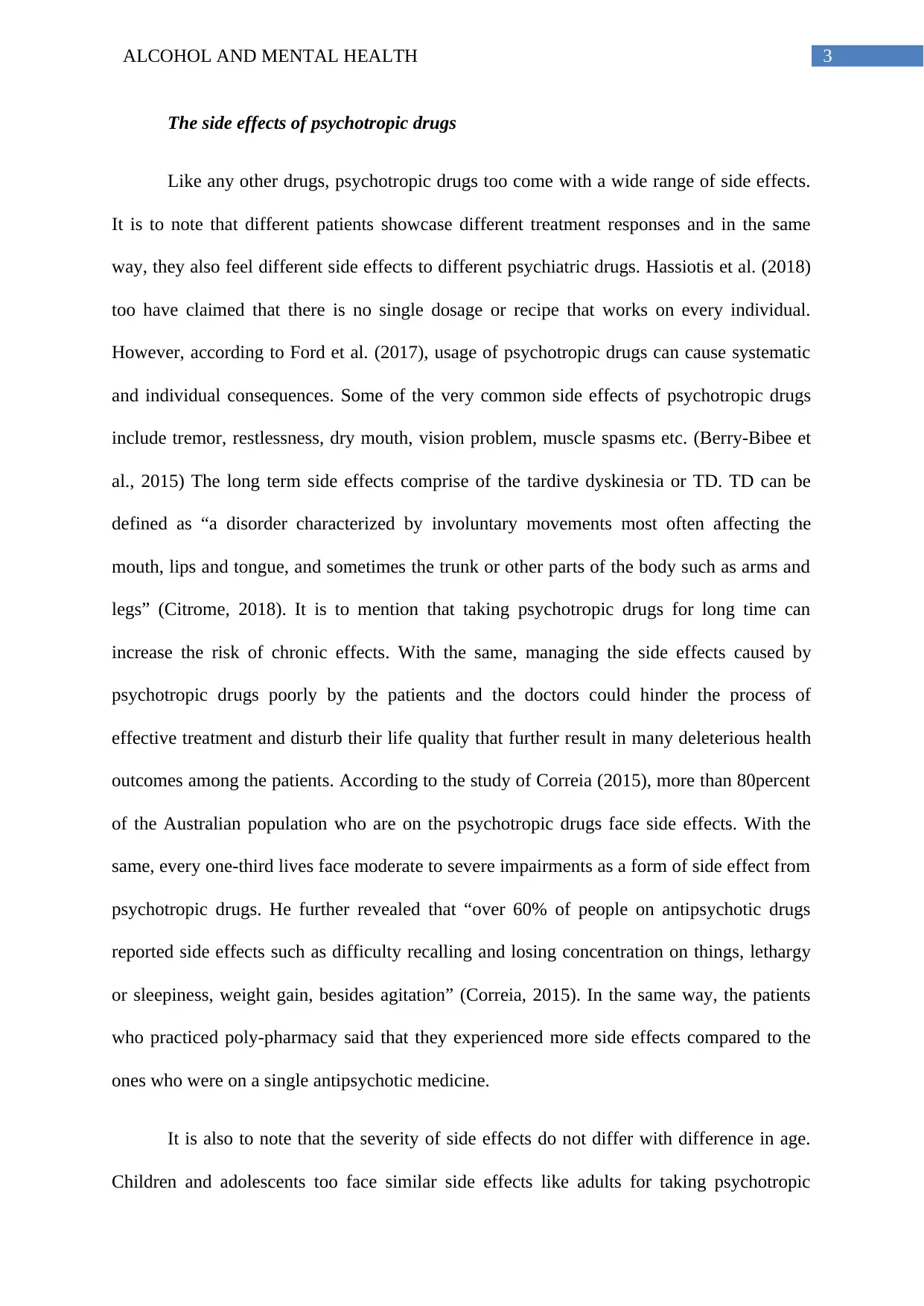
3ALCOHOL AND MENTAL HEALTH
The side effects of psychotropic drugs
Like any other drugs, psychotropic drugs too come with a wide range of side effects.
It is to note that different patients showcase different treatment responses and in the same
way, they also feel different side effects to different psychiatric drugs. Hassiotis et al. (2018)
too have claimed that there is no single dosage or recipe that works on every individual.
However, according to Ford et al. (2017), usage of psychotropic drugs can cause systematic
and individual consequences. Some of the very common side effects of psychotropic drugs
include tremor, restlessness, dry mouth, vision problem, muscle spasms etc. (Berry-Bibee et
al., 2015) The long term side effects comprise of the tardive dyskinesia or TD. TD can be
defined as “a disorder characterized by involuntary movements most often affecting the
mouth, lips and tongue, and sometimes the trunk or other parts of the body such as arms and
legs” (Citrome, 2018). It is to mention that taking psychotropic drugs for long time can
increase the risk of chronic effects. With the same, managing the side effects caused by
psychotropic drugs poorly by the patients and the doctors could hinder the process of
effective treatment and disturb their life quality that further result in many deleterious health
outcomes among the patients. According to the study of Correia (2015), more than 80percent
of the Australian population who are on the psychotropic drugs face side effects. With the
same, every one-third lives face moderate to severe impairments as a form of side effect from
psychotropic drugs. He further revealed that “over 60% of people on antipsychotic drugs
reported side effects such as difficulty recalling and losing concentration on things, lethargy
or sleepiness, weight gain, besides agitation” (Correia, 2015). In the same way, the patients
who practiced poly-pharmacy said that they experienced more side effects compared to the
ones who were on a single antipsychotic medicine.
It is also to note that the severity of side effects do not differ with difference in age.
Children and adolescents too face similar side effects like adults for taking psychotropic
The side effects of psychotropic drugs
Like any other drugs, psychotropic drugs too come with a wide range of side effects.
It is to note that different patients showcase different treatment responses and in the same
way, they also feel different side effects to different psychiatric drugs. Hassiotis et al. (2018)
too have claimed that there is no single dosage or recipe that works on every individual.
However, according to Ford et al. (2017), usage of psychotropic drugs can cause systematic
and individual consequences. Some of the very common side effects of psychotropic drugs
include tremor, restlessness, dry mouth, vision problem, muscle spasms etc. (Berry-Bibee et
al., 2015) The long term side effects comprise of the tardive dyskinesia or TD. TD can be
defined as “a disorder characterized by involuntary movements most often affecting the
mouth, lips and tongue, and sometimes the trunk or other parts of the body such as arms and
legs” (Citrome, 2018). It is to mention that taking psychotropic drugs for long time can
increase the risk of chronic effects. With the same, managing the side effects caused by
psychotropic drugs poorly by the patients and the doctors could hinder the process of
effective treatment and disturb their life quality that further result in many deleterious health
outcomes among the patients. According to the study of Correia (2015), more than 80percent
of the Australian population who are on the psychotropic drugs face side effects. With the
same, every one-third lives face moderate to severe impairments as a form of side effect from
psychotropic drugs. He further revealed that “over 60% of people on antipsychotic drugs
reported side effects such as difficulty recalling and losing concentration on things, lethargy
or sleepiness, weight gain, besides agitation” (Correia, 2015). In the same way, the patients
who practiced poly-pharmacy said that they experienced more side effects compared to the
ones who were on a single antipsychotic medicine.
It is also to note that the severity of side effects do not differ with difference in age.
Children and adolescents too face similar side effects like adults for taking psychotropic
Secure Best Marks with AI Grader
Need help grading? Try our AI Grader for instant feedback on your assignments.
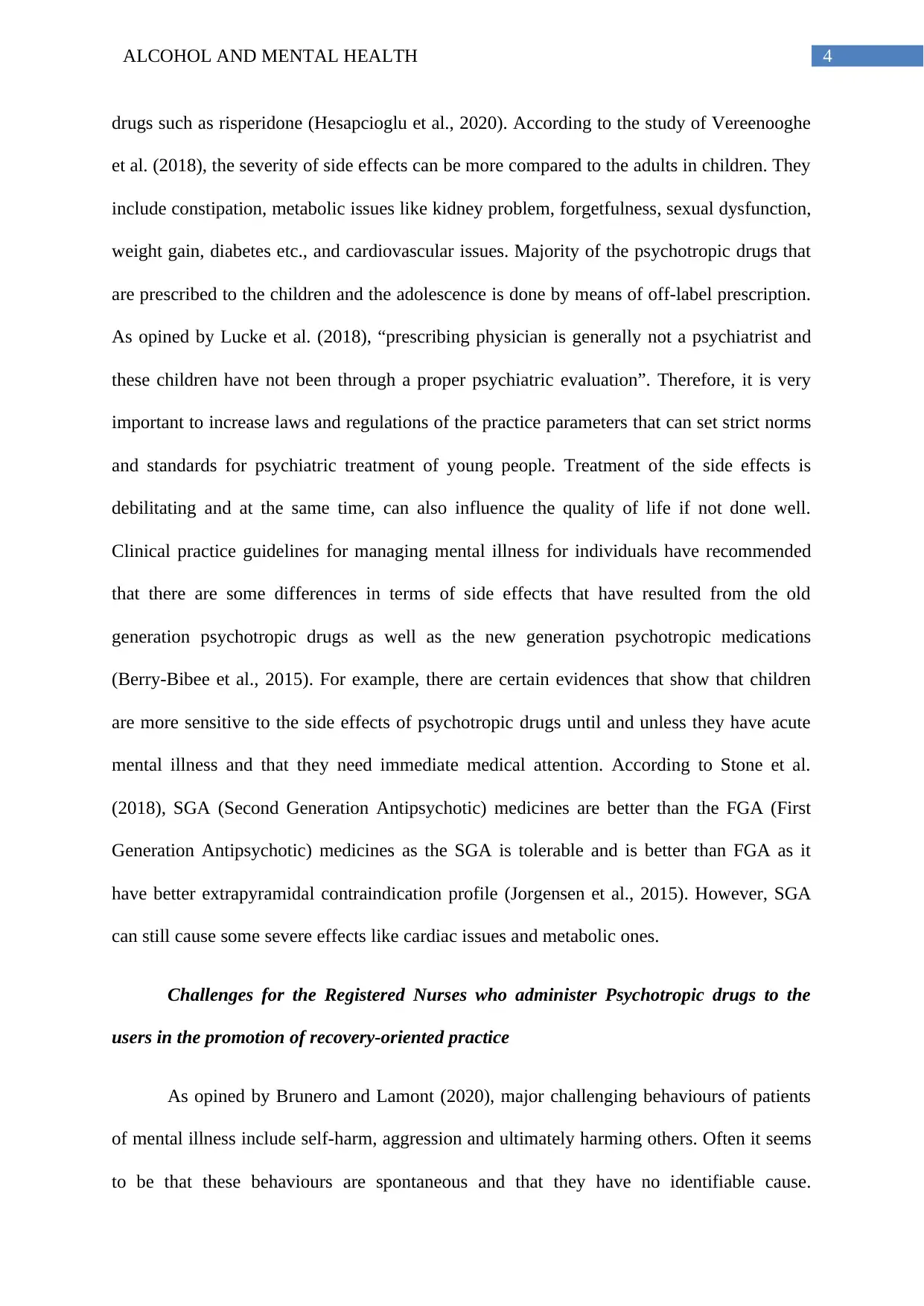
4ALCOHOL AND MENTAL HEALTH
drugs such as risperidone (Hesapcioglu et al., 2020). According to the study of Vereenooghe
et al. (2018), the severity of side effects can be more compared to the adults in children. They
include constipation, metabolic issues like kidney problem, forgetfulness, sexual dysfunction,
weight gain, diabetes etc., and cardiovascular issues. Majority of the psychotropic drugs that
are prescribed to the children and the adolescence is done by means of off-label prescription.
As opined by Lucke et al. (2018), “prescribing physician is generally not a psychiatrist and
these children have not been through a proper psychiatric evaluation”. Therefore, it is very
important to increase laws and regulations of the practice parameters that can set strict norms
and standards for psychiatric treatment of young people. Treatment of the side effects is
debilitating and at the same time, can also influence the quality of life if not done well.
Clinical practice guidelines for managing mental illness for individuals have recommended
that there are some differences in terms of side effects that have resulted from the old
generation psychotropic drugs as well as the new generation psychotropic medications
(Berry-Bibee et al., 2015). For example, there are certain evidences that show that children
are more sensitive to the side effects of psychotropic drugs until and unless they have acute
mental illness and that they need immediate medical attention. According to Stone et al.
(2018), SGA (Second Generation Antipsychotic) medicines are better than the FGA (First
Generation Antipsychotic) medicines as the SGA is tolerable and is better than FGA as it
have better extrapyramidal contraindication profile (Jorgensen et al., 2015). However, SGA
can still cause some severe effects like cardiac issues and metabolic ones.
Challenges for the Registered Nurses who administer Psychotropic drugs to the
users in the promotion of recovery-oriented practice
As opined by Brunero and Lamont (2020), major challenging behaviours of patients
of mental illness include self-harm, aggression and ultimately harming others. Often it seems
to be that these behaviours are spontaneous and that they have no identifiable cause.
drugs such as risperidone (Hesapcioglu et al., 2020). According to the study of Vereenooghe
et al. (2018), the severity of side effects can be more compared to the adults in children. They
include constipation, metabolic issues like kidney problem, forgetfulness, sexual dysfunction,
weight gain, diabetes etc., and cardiovascular issues. Majority of the psychotropic drugs that
are prescribed to the children and the adolescence is done by means of off-label prescription.
As opined by Lucke et al. (2018), “prescribing physician is generally not a psychiatrist and
these children have not been through a proper psychiatric evaluation”. Therefore, it is very
important to increase laws and regulations of the practice parameters that can set strict norms
and standards for psychiatric treatment of young people. Treatment of the side effects is
debilitating and at the same time, can also influence the quality of life if not done well.
Clinical practice guidelines for managing mental illness for individuals have recommended
that there are some differences in terms of side effects that have resulted from the old
generation psychotropic drugs as well as the new generation psychotropic medications
(Berry-Bibee et al., 2015). For example, there are certain evidences that show that children
are more sensitive to the side effects of psychotropic drugs until and unless they have acute
mental illness and that they need immediate medical attention. According to Stone et al.
(2018), SGA (Second Generation Antipsychotic) medicines are better than the FGA (First
Generation Antipsychotic) medicines as the SGA is tolerable and is better than FGA as it
have better extrapyramidal contraindication profile (Jorgensen et al., 2015). However, SGA
can still cause some severe effects like cardiac issues and metabolic ones.
Challenges for the Registered Nurses who administer Psychotropic drugs to the
users in the promotion of recovery-oriented practice
As opined by Brunero and Lamont (2020), major challenging behaviours of patients
of mental illness include self-harm, aggression and ultimately harming others. Often it seems
to be that these behaviours are spontaneous and that they have no identifiable cause.
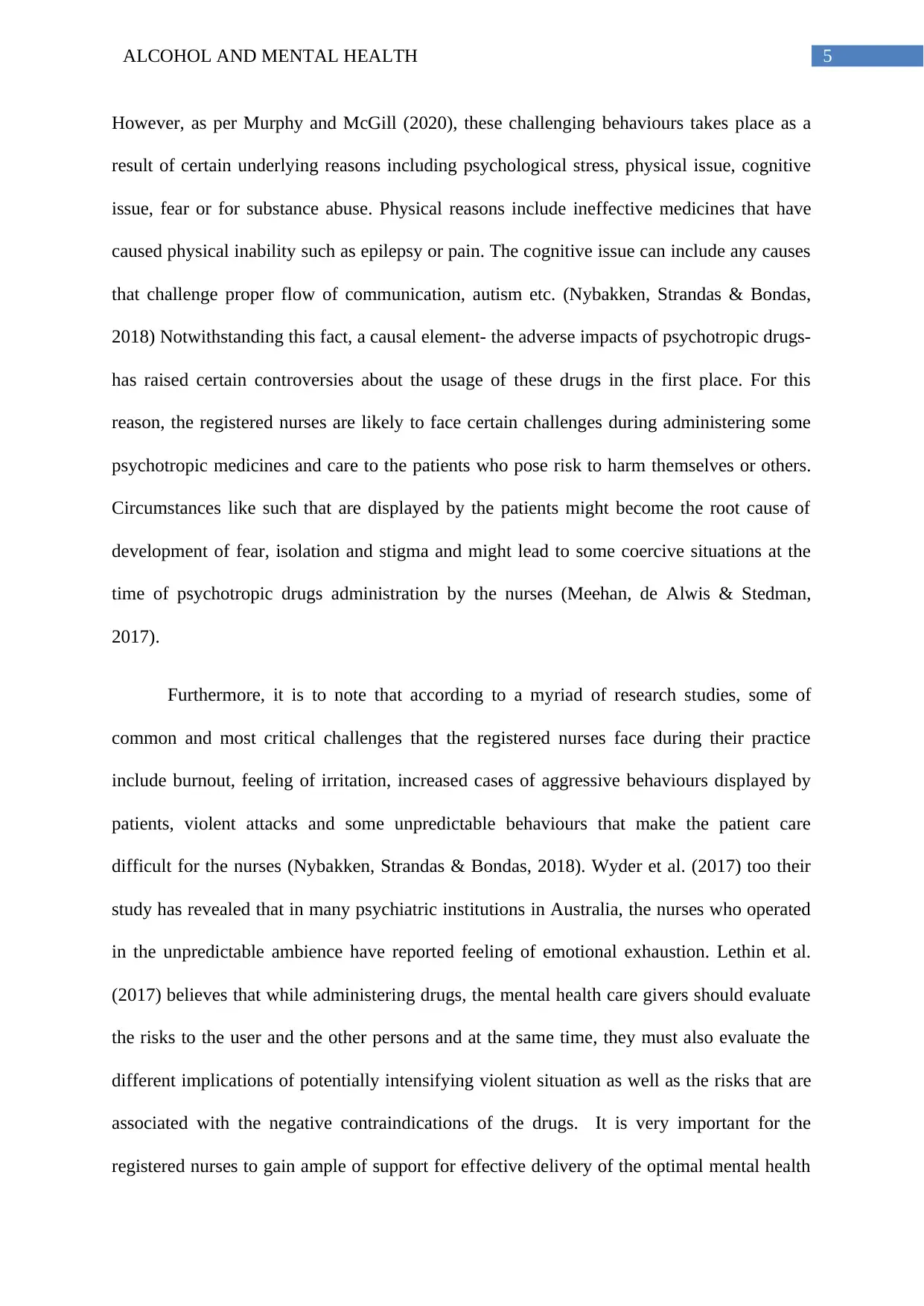
5ALCOHOL AND MENTAL HEALTH
However, as per Murphy and McGill (2020), these challenging behaviours takes place as a
result of certain underlying reasons including psychological stress, physical issue, cognitive
issue, fear or for substance abuse. Physical reasons include ineffective medicines that have
caused physical inability such as epilepsy or pain. The cognitive issue can include any causes
that challenge proper flow of communication, autism etc. (Nybakken, Strandas & Bondas,
2018) Notwithstanding this fact, a causal element- the adverse impacts of psychotropic drugs-
has raised certain controversies about the usage of these drugs in the first place. For this
reason, the registered nurses are likely to face certain challenges during administering some
psychotropic medicines and care to the patients who pose risk to harm themselves or others.
Circumstances like such that are displayed by the patients might become the root cause of
development of fear, isolation and stigma and might lead to some coercive situations at the
time of psychotropic drugs administration by the nurses (Meehan, de Alwis & Stedman,
2017).
Furthermore, it is to note that according to a myriad of research studies, some of
common and most critical challenges that the registered nurses face during their practice
include burnout, feeling of irritation, increased cases of aggressive behaviours displayed by
patients, violent attacks and some unpredictable behaviours that make the patient care
difficult for the nurses (Nybakken, Strandas & Bondas, 2018). Wyder et al. (2017) too their
study has revealed that in many psychiatric institutions in Australia, the nurses who operated
in the unpredictable ambience have reported feeling of emotional exhaustion. Lethin et al.
(2017) believes that while administering drugs, the mental health care givers should evaluate
the risks to the user and the other persons and at the same time, they must also evaluate the
different implications of potentially intensifying violent situation as well as the risks that are
associated with the negative contraindications of the drugs. It is very important for the
registered nurses to gain ample of support for effective delivery of the optimal mental health
However, as per Murphy and McGill (2020), these challenging behaviours takes place as a
result of certain underlying reasons including psychological stress, physical issue, cognitive
issue, fear or for substance abuse. Physical reasons include ineffective medicines that have
caused physical inability such as epilepsy or pain. The cognitive issue can include any causes
that challenge proper flow of communication, autism etc. (Nybakken, Strandas & Bondas,
2018) Notwithstanding this fact, a causal element- the adverse impacts of psychotropic drugs-
has raised certain controversies about the usage of these drugs in the first place. For this
reason, the registered nurses are likely to face certain challenges during administering some
psychotropic medicines and care to the patients who pose risk to harm themselves or others.
Circumstances like such that are displayed by the patients might become the root cause of
development of fear, isolation and stigma and might lead to some coercive situations at the
time of psychotropic drugs administration by the nurses (Meehan, de Alwis & Stedman,
2017).
Furthermore, it is to note that according to a myriad of research studies, some of
common and most critical challenges that the registered nurses face during their practice
include burnout, feeling of irritation, increased cases of aggressive behaviours displayed by
patients, violent attacks and some unpredictable behaviours that make the patient care
difficult for the nurses (Nybakken, Strandas & Bondas, 2018). Wyder et al. (2017) too their
study has revealed that in many psychiatric institutions in Australia, the nurses who operated
in the unpredictable ambience have reported feeling of emotional exhaustion. Lethin et al.
(2017) believes that while administering drugs, the mental health care givers should evaluate
the risks to the user and the other persons and at the same time, they must also evaluate the
different implications of potentially intensifying violent situation as well as the risks that are
associated with the negative contraindications of the drugs. It is very important for the
registered nurses to gain ample of support for effective delivery of the optimal mental health
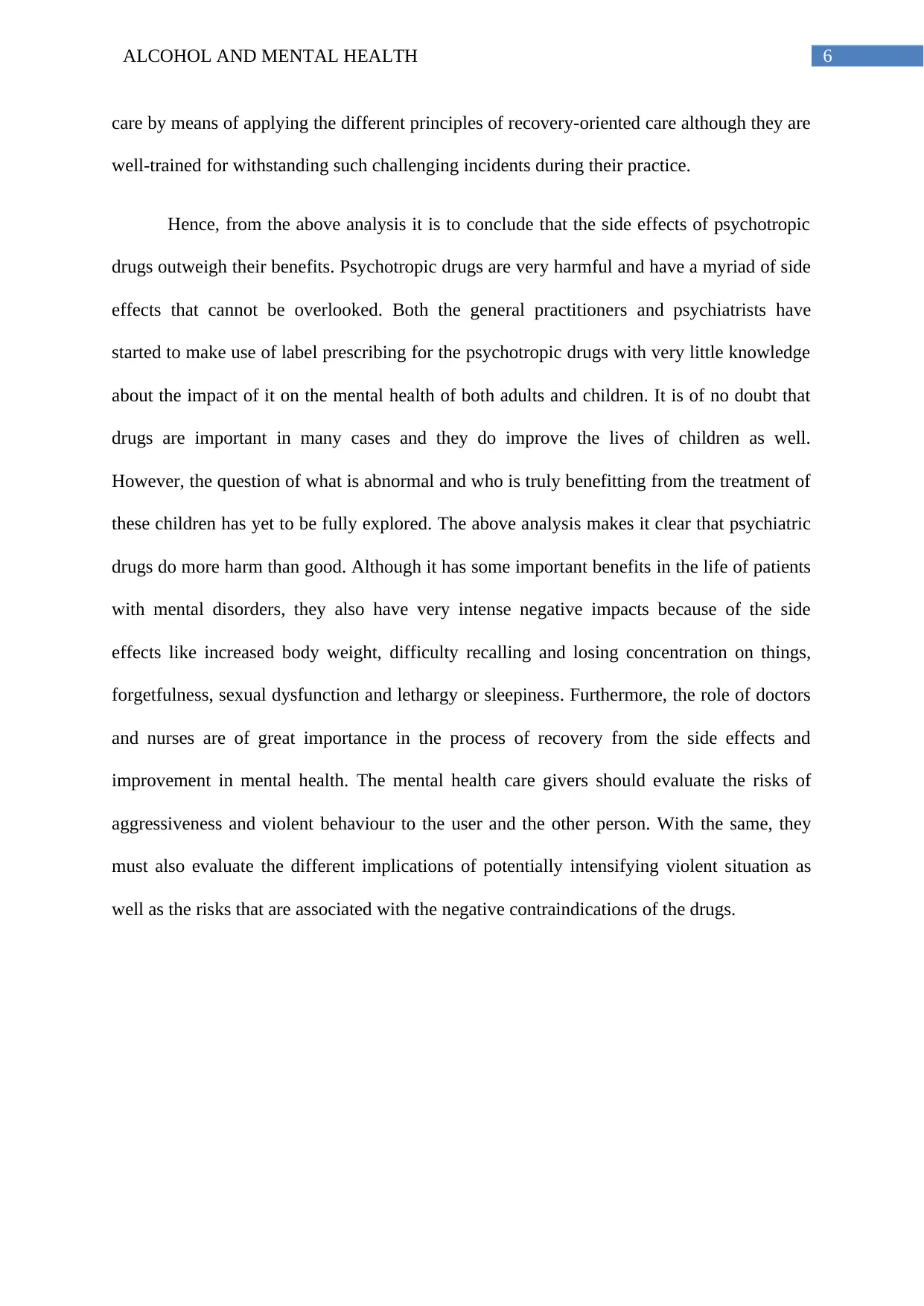
6ALCOHOL AND MENTAL HEALTH
care by means of applying the different principles of recovery-oriented care although they are
well-trained for withstanding such challenging incidents during their practice.
Hence, from the above analysis it is to conclude that the side effects of psychotropic
drugs outweigh their benefits. Psychotropic drugs are very harmful and have a myriad of side
effects that cannot be overlooked. Both the general practitioners and psychiatrists have
started to make use of label prescribing for the psychotropic drugs with very little knowledge
about the impact of it on the mental health of both adults and children. It is of no doubt that
drugs are important in many cases and they do improve the lives of children as well.
However, the question of what is abnormal and who is truly benefitting from the treatment of
these children has yet to be fully explored. The above analysis makes it clear that psychiatric
drugs do more harm than good. Although it has some important benefits in the life of patients
with mental disorders, they also have very intense negative impacts because of the side
effects like increased body weight, difficulty recalling and losing concentration on things,
forgetfulness, sexual dysfunction and lethargy or sleepiness. Furthermore, the role of doctors
and nurses are of great importance in the process of recovery from the side effects and
improvement in mental health. The mental health care givers should evaluate the risks of
aggressiveness and violent behaviour to the user and the other person. With the same, they
must also evaluate the different implications of potentially intensifying violent situation as
well as the risks that are associated with the negative contraindications of the drugs.
care by means of applying the different principles of recovery-oriented care although they are
well-trained for withstanding such challenging incidents during their practice.
Hence, from the above analysis it is to conclude that the side effects of psychotropic
drugs outweigh their benefits. Psychotropic drugs are very harmful and have a myriad of side
effects that cannot be overlooked. Both the general practitioners and psychiatrists have
started to make use of label prescribing for the psychotropic drugs with very little knowledge
about the impact of it on the mental health of both adults and children. It is of no doubt that
drugs are important in many cases and they do improve the lives of children as well.
However, the question of what is abnormal and who is truly benefitting from the treatment of
these children has yet to be fully explored. The above analysis makes it clear that psychiatric
drugs do more harm than good. Although it has some important benefits in the life of patients
with mental disorders, they also have very intense negative impacts because of the side
effects like increased body weight, difficulty recalling and losing concentration on things,
forgetfulness, sexual dysfunction and lethargy or sleepiness. Furthermore, the role of doctors
and nurses are of great importance in the process of recovery from the side effects and
improvement in mental health. The mental health care givers should evaluate the risks of
aggressiveness and violent behaviour to the user and the other person. With the same, they
must also evaluate the different implications of potentially intensifying violent situation as
well as the risks that are associated with the negative contraindications of the drugs.
Paraphrase This Document
Need a fresh take? Get an instant paraphrase of this document with our AI Paraphraser
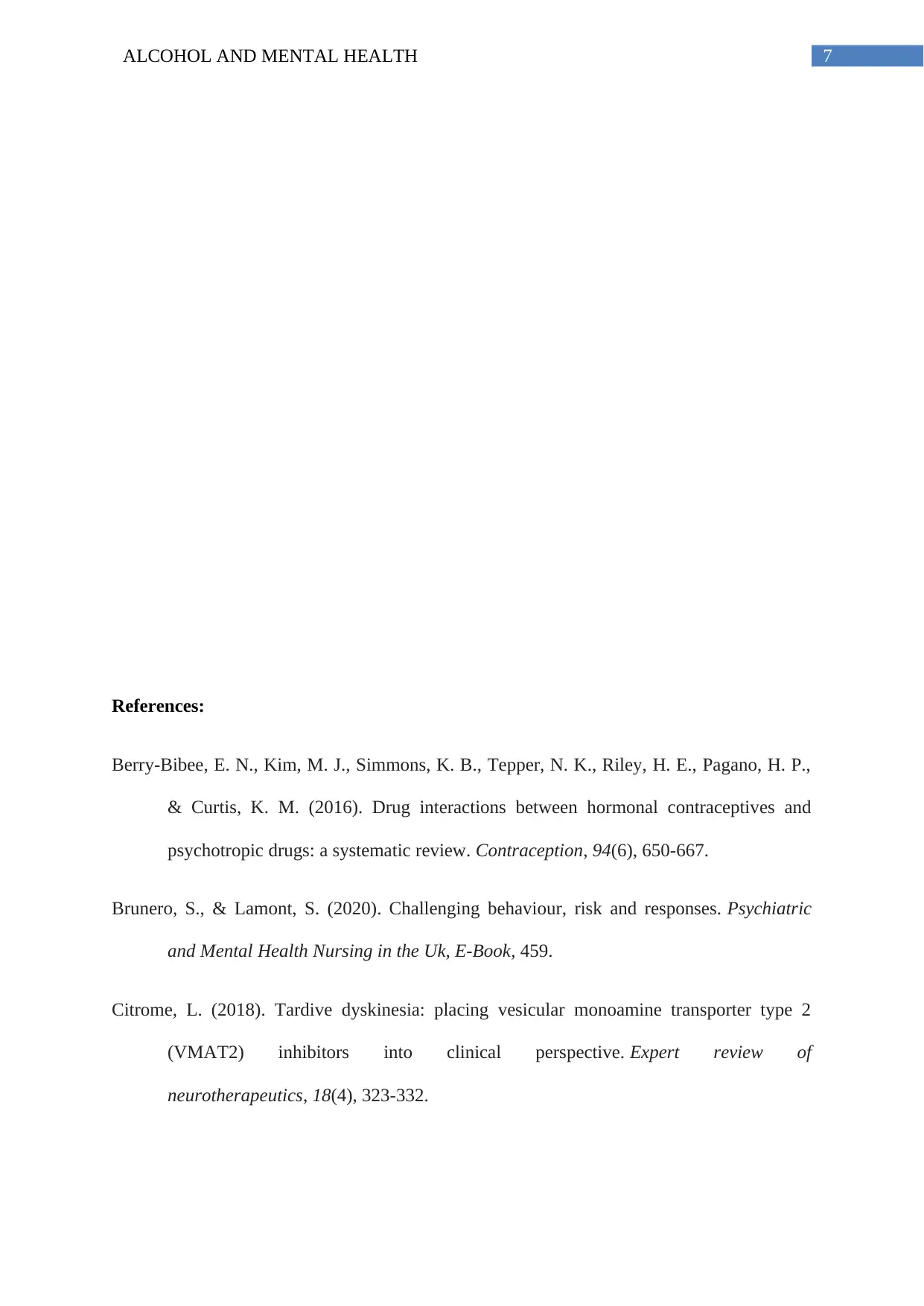
7ALCOHOL AND MENTAL HEALTH
References:
Berry-Bibee, E. N., Kim, M. J., Simmons, K. B., Tepper, N. K., Riley, H. E., Pagano, H. P.,
& Curtis, K. M. (2016). Drug interactions between hormonal contraceptives and
psychotropic drugs: a systematic review. Contraception, 94(6), 650-667.
Brunero, S., & Lamont, S. (2020). Challenging behaviour, risk and responses. Psychiatric
and Mental Health Nursing in the Uk, E-Book, 459.
Citrome, L. (2018). Tardive dyskinesia: placing vesicular monoamine transporter type 2
(VMAT2) inhibitors into clinical perspective. Expert review of
neurotherapeutics, 18(4), 323-332.
References:
Berry-Bibee, E. N., Kim, M. J., Simmons, K. B., Tepper, N. K., Riley, H. E., Pagano, H. P.,
& Curtis, K. M. (2016). Drug interactions between hormonal contraceptives and
psychotropic drugs: a systematic review. Contraception, 94(6), 650-667.
Brunero, S., & Lamont, S. (2020). Challenging behaviour, risk and responses. Psychiatric
and Mental Health Nursing in the Uk, E-Book, 459.
Citrome, L. (2018). Tardive dyskinesia: placing vesicular monoamine transporter type 2
(VMAT2) inhibitors into clinical perspective. Expert review of
neurotherapeutics, 18(4), 323-332.
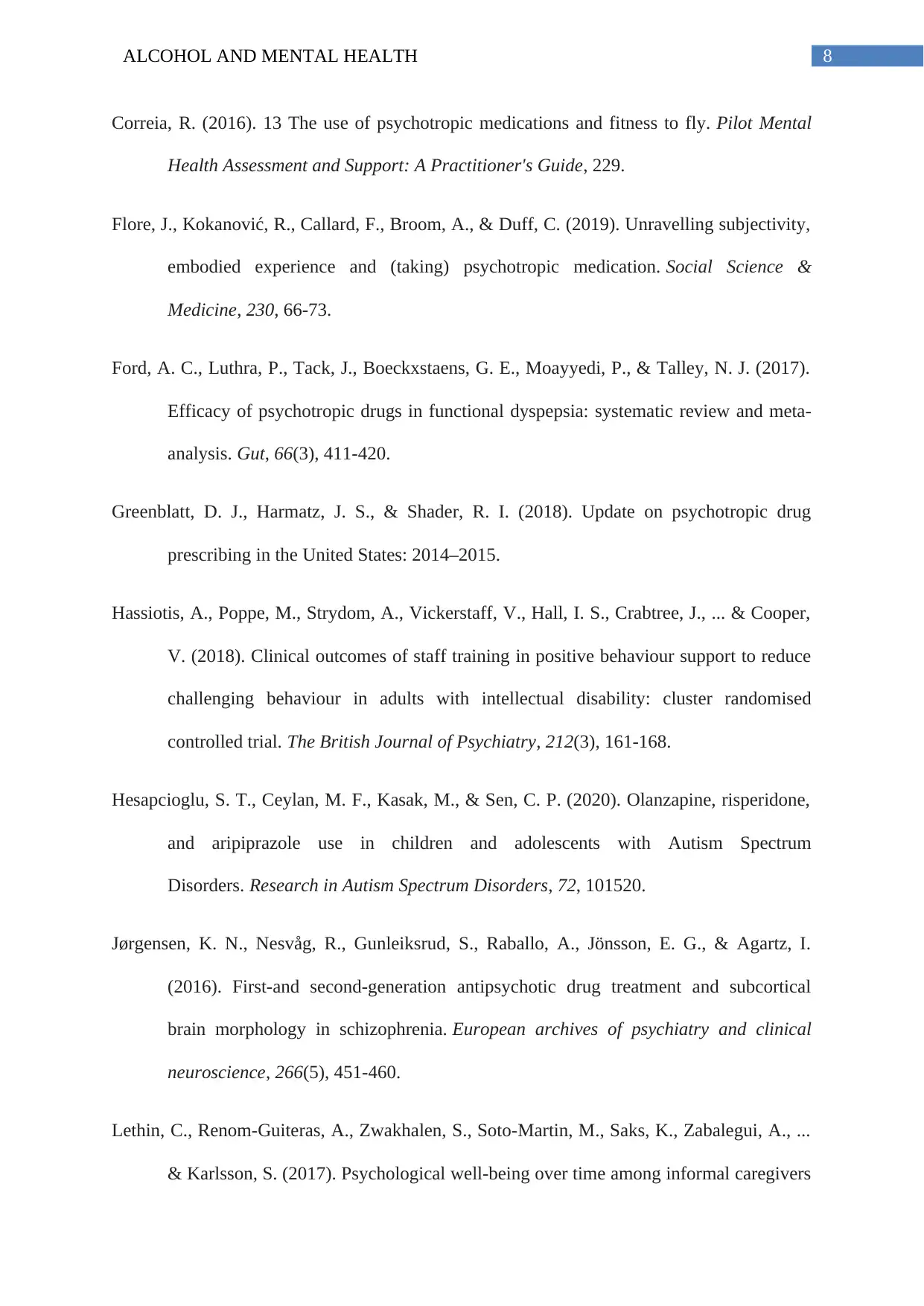
8ALCOHOL AND MENTAL HEALTH
Correia, R. (2016). 13 The use of psychotropic medications and fitness to fly. Pilot Mental
Health Assessment and Support: A Practitioner's Guide, 229.
Flore, J., Kokanović, R., Callard, F., Broom, A., & Duff, C. (2019). Unravelling subjectivity,
embodied experience and (taking) psychotropic medication. Social Science &
Medicine, 230, 66-73.
Ford, A. C., Luthra, P., Tack, J., Boeckxstaens, G. E., Moayyedi, P., & Talley, N. J. (2017).
Efficacy of psychotropic drugs in functional dyspepsia: systematic review and meta-
analysis. Gut, 66(3), 411-420.
Greenblatt, D. J., Harmatz, J. S., & Shader, R. I. (2018). Update on psychotropic drug
prescribing in the United States: 2014–2015.
Hassiotis, A., Poppe, M., Strydom, A., Vickerstaff, V., Hall, I. S., Crabtree, J., ... & Cooper,
V. (2018). Clinical outcomes of staff training in positive behaviour support to reduce
challenging behaviour in adults with intellectual disability: cluster randomised
controlled trial. The British Journal of Psychiatry, 212(3), 161-168.
Hesapcioglu, S. T., Ceylan, M. F., Kasak, M., & Sen, C. P. (2020). Olanzapine, risperidone,
and aripiprazole use in children and adolescents with Autism Spectrum
Disorders. Research in Autism Spectrum Disorders, 72, 101520.
Jørgensen, K. N., Nesvåg, R., Gunleiksrud, S., Raballo, A., Jönsson, E. G., & Agartz, I.
(2016). First-and second-generation antipsychotic drug treatment and subcortical
brain morphology in schizophrenia. European archives of psychiatry and clinical
neuroscience, 266(5), 451-460.
Lethin, C., Renom-Guiteras, A., Zwakhalen, S., Soto-Martin, M., Saks, K., Zabalegui, A., ...
& Karlsson, S. (2017). Psychological well-being over time among informal caregivers
Correia, R. (2016). 13 The use of psychotropic medications and fitness to fly. Pilot Mental
Health Assessment and Support: A Practitioner's Guide, 229.
Flore, J., Kokanović, R., Callard, F., Broom, A., & Duff, C. (2019). Unravelling subjectivity,
embodied experience and (taking) psychotropic medication. Social Science &
Medicine, 230, 66-73.
Ford, A. C., Luthra, P., Tack, J., Boeckxstaens, G. E., Moayyedi, P., & Talley, N. J. (2017).
Efficacy of psychotropic drugs in functional dyspepsia: systematic review and meta-
analysis. Gut, 66(3), 411-420.
Greenblatt, D. J., Harmatz, J. S., & Shader, R. I. (2018). Update on psychotropic drug
prescribing in the United States: 2014–2015.
Hassiotis, A., Poppe, M., Strydom, A., Vickerstaff, V., Hall, I. S., Crabtree, J., ... & Cooper,
V. (2018). Clinical outcomes of staff training in positive behaviour support to reduce
challenging behaviour in adults with intellectual disability: cluster randomised
controlled trial. The British Journal of Psychiatry, 212(3), 161-168.
Hesapcioglu, S. T., Ceylan, M. F., Kasak, M., & Sen, C. P. (2020). Olanzapine, risperidone,
and aripiprazole use in children and adolescents with Autism Spectrum
Disorders. Research in Autism Spectrum Disorders, 72, 101520.
Jørgensen, K. N., Nesvåg, R., Gunleiksrud, S., Raballo, A., Jönsson, E. G., & Agartz, I.
(2016). First-and second-generation antipsychotic drug treatment and subcortical
brain morphology in schizophrenia. European archives of psychiatry and clinical
neuroscience, 266(5), 451-460.
Lethin, C., Renom-Guiteras, A., Zwakhalen, S., Soto-Martin, M., Saks, K., Zabalegui, A., ...
& Karlsson, S. (2017). Psychological well-being over time among informal caregivers
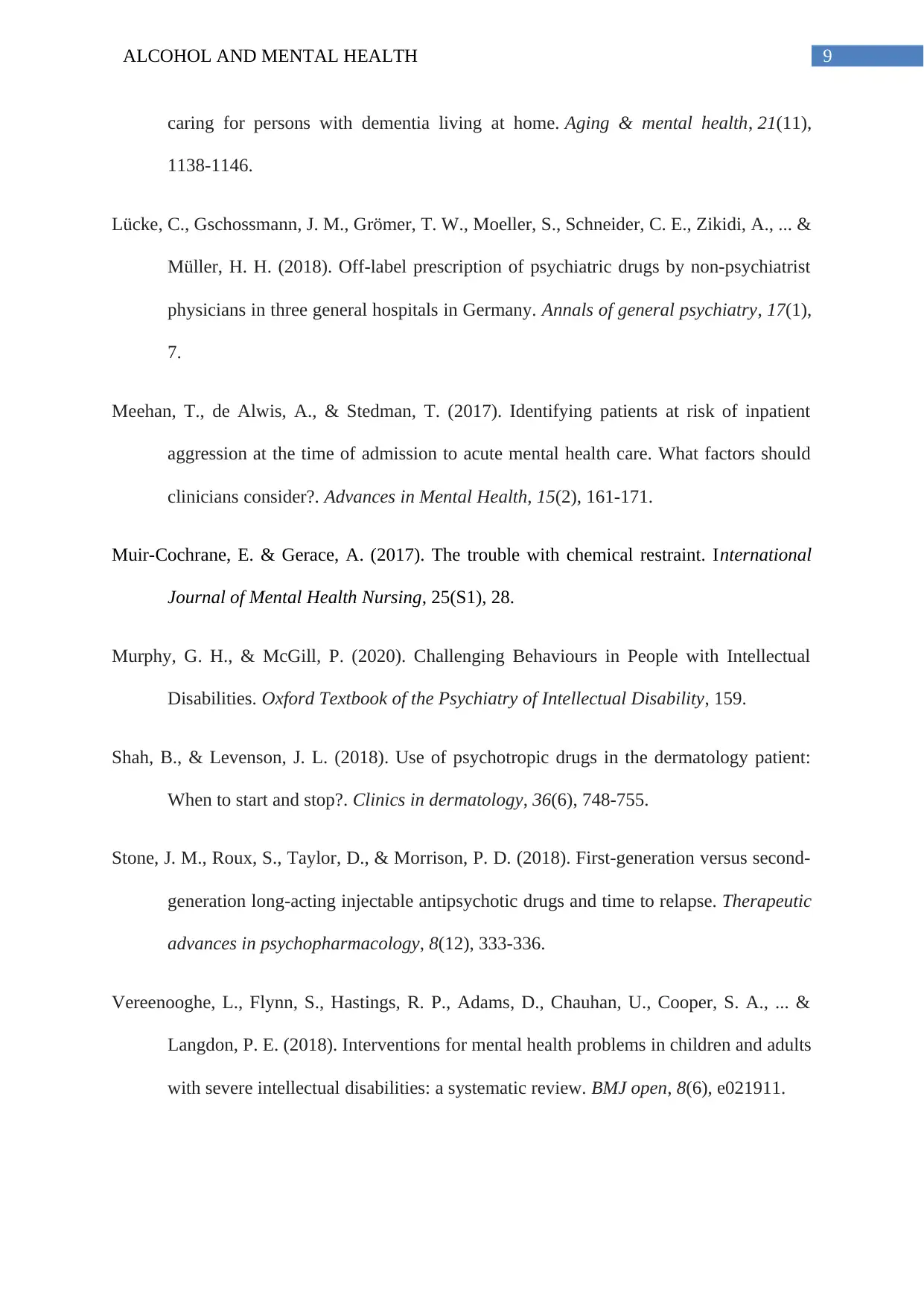
9ALCOHOL AND MENTAL HEALTH
caring for persons with dementia living at home. Aging & mental health, 21(11),
1138-1146.
Lücke, C., Gschossmann, J. M., Grömer, T. W., Moeller, S., Schneider, C. E., Zikidi, A., ... &
Müller, H. H. (2018). Off-label prescription of psychiatric drugs by non-psychiatrist
physicians in three general hospitals in Germany. Annals of general psychiatry, 17(1),
7.
Meehan, T., de Alwis, A., & Stedman, T. (2017). Identifying patients at risk of inpatient
aggression at the time of admission to acute mental health care. What factors should
clinicians consider?. Advances in Mental Health, 15(2), 161-171.
Muir-Cochrane, E. & Gerace, A. (2017). The trouble with chemical restraint. International
Journal of Mental Health Nursing, 25(S1), 28.
Murphy, G. H., & McGill, P. (2020). Challenging Behaviours in People with Intellectual
Disabilities. Oxford Textbook of the Psychiatry of Intellectual Disability, 159.
Shah, B., & Levenson, J. L. (2018). Use of psychotropic drugs in the dermatology patient:
When to start and stop?. Clinics in dermatology, 36(6), 748-755.
Stone, J. M., Roux, S., Taylor, D., & Morrison, P. D. (2018). First-generation versus second-
generation long-acting injectable antipsychotic drugs and time to relapse. Therapeutic
advances in psychopharmacology, 8(12), 333-336.
Vereenooghe, L., Flynn, S., Hastings, R. P., Adams, D., Chauhan, U., Cooper, S. A., ... &
Langdon, P. E. (2018). Interventions for mental health problems in children and adults
with severe intellectual disabilities: a systematic review. BMJ open, 8(6), e021911.
caring for persons with dementia living at home. Aging & mental health, 21(11),
1138-1146.
Lücke, C., Gschossmann, J. M., Grömer, T. W., Moeller, S., Schneider, C. E., Zikidi, A., ... &
Müller, H. H. (2018). Off-label prescription of psychiatric drugs by non-psychiatrist
physicians in three general hospitals in Germany. Annals of general psychiatry, 17(1),
7.
Meehan, T., de Alwis, A., & Stedman, T. (2017). Identifying patients at risk of inpatient
aggression at the time of admission to acute mental health care. What factors should
clinicians consider?. Advances in Mental Health, 15(2), 161-171.
Muir-Cochrane, E. & Gerace, A. (2017). The trouble with chemical restraint. International
Journal of Mental Health Nursing, 25(S1), 28.
Murphy, G. H., & McGill, P. (2020). Challenging Behaviours in People with Intellectual
Disabilities. Oxford Textbook of the Psychiatry of Intellectual Disability, 159.
Shah, B., & Levenson, J. L. (2018). Use of psychotropic drugs in the dermatology patient:
When to start and stop?. Clinics in dermatology, 36(6), 748-755.
Stone, J. M., Roux, S., Taylor, D., & Morrison, P. D. (2018). First-generation versus second-
generation long-acting injectable antipsychotic drugs and time to relapse. Therapeutic
advances in psychopharmacology, 8(12), 333-336.
Vereenooghe, L., Flynn, S., Hastings, R. P., Adams, D., Chauhan, U., Cooper, S. A., ... &
Langdon, P. E. (2018). Interventions for mental health problems in children and adults
with severe intellectual disabilities: a systematic review. BMJ open, 8(6), e021911.
Secure Best Marks with AI Grader
Need help grading? Try our AI Grader for instant feedback on your assignments.
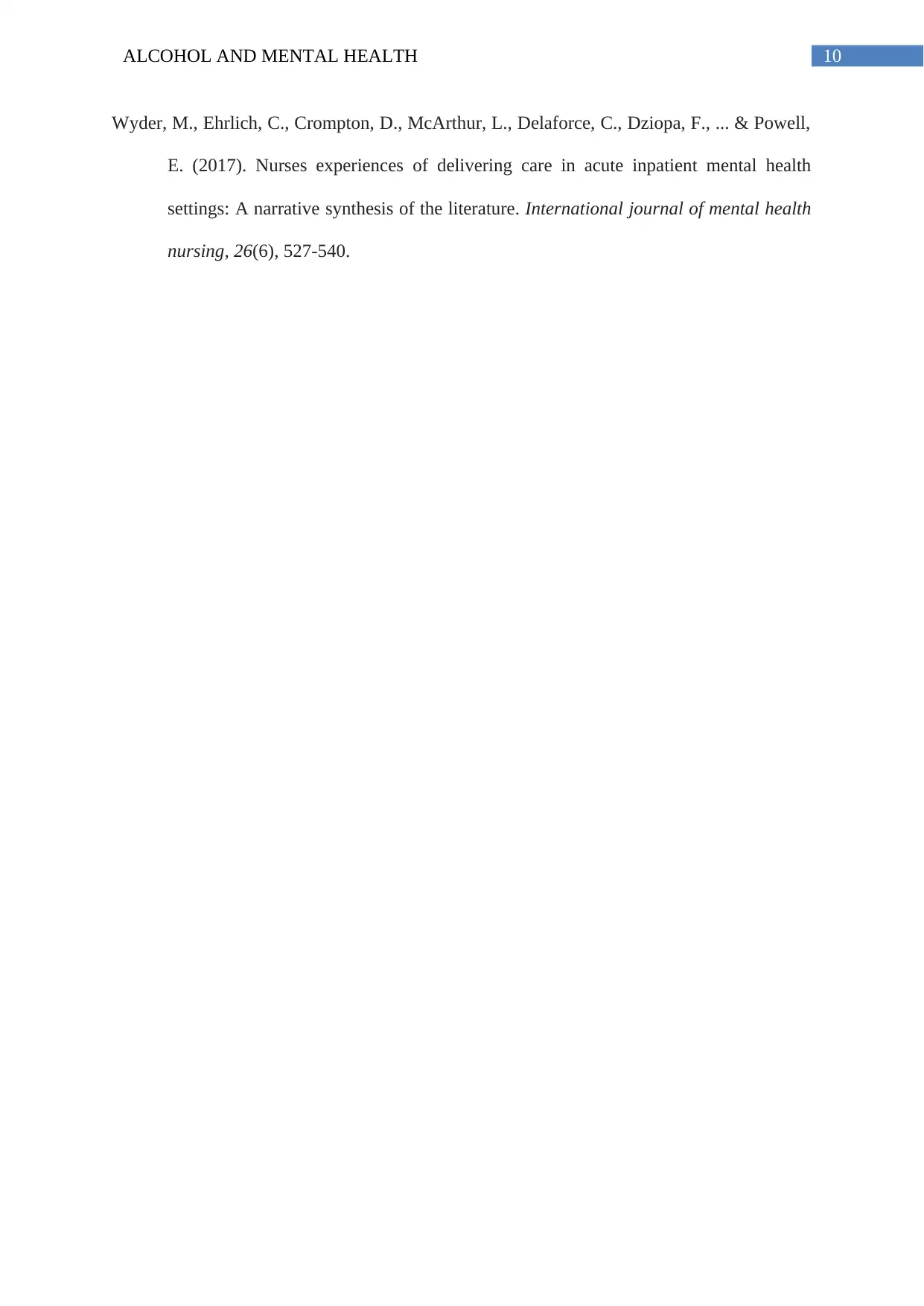
10ALCOHOL AND MENTAL HEALTH
Wyder, M., Ehrlich, C., Crompton, D., McArthur, L., Delaforce, C., Dziopa, F., ... & Powell,
E. (2017). Nurses experiences of delivering care in acute inpatient mental health
settings: A narrative synthesis of the literature. International journal of mental health
nursing, 26(6), 527-540.
Wyder, M., Ehrlich, C., Crompton, D., McArthur, L., Delaforce, C., Dziopa, F., ... & Powell,
E. (2017). Nurses experiences of delivering care in acute inpatient mental health
settings: A narrative synthesis of the literature. International journal of mental health
nursing, 26(6), 527-540.
1 out of 11
Related Documents
Your All-in-One AI-Powered Toolkit for Academic Success.
+13062052269
info@desklib.com
Available 24*7 on WhatsApp / Email
![[object Object]](/_next/static/media/star-bottom.7253800d.svg)
Unlock your academic potential
© 2024 | Zucol Services PVT LTD | All rights reserved.





